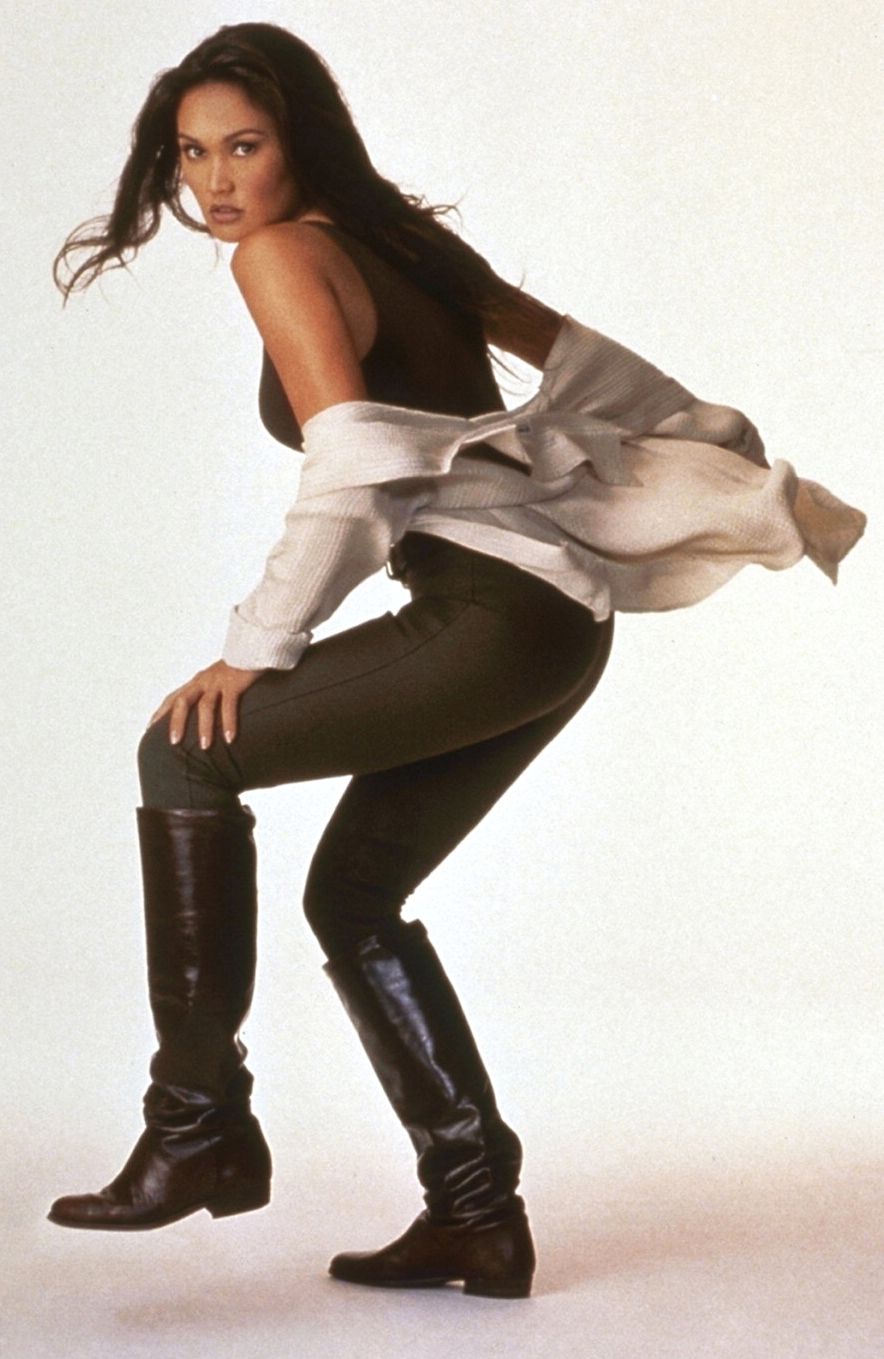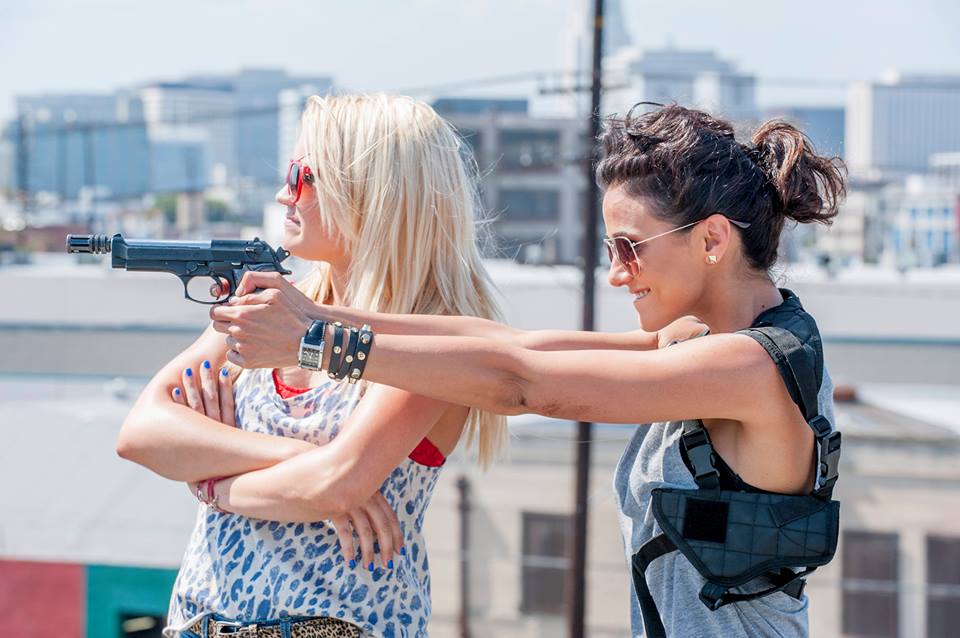 ★★★★
★★★★
“Girls, guns and cars. Well, one car, anyway…”
 Crackle is the streaming content subsidiary of Sony – it has been around for a while, but we only became aware of it last December, when a new widget popped up on our Apple TV. Think of it as a little like an advert-supported version of Netflix; you can watch for free, whenever you want, but you have to “pay” by sitting through commercials (during which the FF option on your remote is disabled. Bastards!). The library of movies and shows offered is based around that studio’s library, and has a number of entries for action heroine fans. Bonus points, not just for having Run Lola Run, but in the subtitled version; they also have Ultraviolet: Code 044, the anime spin-off from Milla Jovovich’s action-horror film, though that is only available dubbed. We’ll get to that later, I imagine, but the first thing to leap out at us was this original series, about a pair of female assassins. It’s certainly not to be confused with the Samuel L. Jackson movie or Benjamin Brett show.
Crackle is the streaming content subsidiary of Sony – it has been around for a while, but we only became aware of it last December, when a new widget popped up on our Apple TV. Think of it as a little like an advert-supported version of Netflix; you can watch for free, whenever you want, but you have to “pay” by sitting through commercials (during which the FF option on your remote is disabled. Bastards!). The library of movies and shows offered is based around that studio’s library, and has a number of entries for action heroine fans. Bonus points, not just for having Run Lola Run, but in the subtitled version; they also have Ultraviolet: Code 044, the anime spin-off from Milla Jovovich’s action-horror film, though that is only available dubbed. We’ll get to that later, I imagine, but the first thing to leap out at us was this original series, about a pair of female assassins. It’s certainly not to be confused with the Samuel L. Jackson movie or Benjamin Brett show.
The two heroines are Veronica (Chriqui) and Roxie (Osment, straying far from her Hannah Montana roots). Both are hit-women, working for “Mother” (Gershon), but that’s about all they have in common: Veronica is serious and almost OCD about her work, while the much younger Roxie is a party animal who shoots first and asks questions… Well, almost never. Mother insists they work together on this case, much to both their chagrin. This particular mission involves the repossession of a classic car from its current thuggish owners. The car is then to be driven to Point B, without stopping for any reason. Naturally, that doesn’t quite work out, and they discover an autistic boy, unconscious in the trunk. Turns out, locked in his brain is the key to $57 million dollars. Mother wants him. His dad, currently serving 20 years, wants him. FBI agent Barnes (Arquette) wants him. His mother (Missi Pyle) wants him. Now, they all have to go through Veronica and Roxie to get him.
 There are six episodes, but they’re barely 20 minutes each, discounting adverts, and by the time you remove the credits, and “previously/next time on Cleaners” sections, it’s basically a single feature. Maybe I’ll get round to editing it together in exactly that fashion. There’s a hint of Tarantino in the fast-paced dialogue, as the characters snark back and forth at each other – my favourite line was Roxie’s response, after Veronica had expounded on some topic: “Jesus! What did you have for breakfast? Wikipedia?” Leyden throws on large helpings of style, which is something of an acquired taste: in the first episode, it seemed more of a chore than a pleasure, but as the show wore on, he either restrained himself better or we grew used to it.
There are six episodes, but they’re barely 20 minutes each, discounting adverts, and by the time you remove the credits, and “previously/next time on Cleaners” sections, it’s basically a single feature. Maybe I’ll get round to editing it together in exactly that fashion. There’s a hint of Tarantino in the fast-paced dialogue, as the characters snark back and forth at each other – my favourite line was Roxie’s response, after Veronica had expounded on some topic: “Jesus! What did you have for breakfast? Wikipedia?” Leyden throws on large helpings of style, which is something of an acquired taste: in the first episode, it seemed more of a chore than a pleasure, but as the show wore on, he either restrained himself better or we grew used to it.
The episodic approach doesn’t leave much opportunity to pause for breath, each part having to fit in advancing the storyline, developing the characters and, typically, an action set-piece, involving guns or hand-to-hand combat. For instance, the first episode has Roxie tricking her way into the thugs’ house, and opening the back door so Veronica can join her for a full-out assault. It’s a structure which makes for a copious volume of action overall, and these are both well-shot and assembled – the art of editing fight sequences is something I think is often overlooked. It looks like Chriqui and Osment both handled more of their own work than I’d have expected, though credit should also go to Osment’s stunt double, Mandy Kowalski.
However, it’s the characters which engage the viewer and keep them coming back for more. The two leads have a nice chemistry, bouncing off each other, and there’s a real sense of development as the show progresses. Initially, the pairing feels like Grumpy Cat being forced to socialize with an energetic puppy, but they both come to appreciate the other’s strengths, and the marginal tolerance becomes more based on respect. It’s a similar dynamic to the one we saw in Violet & Daisy, almost a big/little sister relationship. I do have some doubts about the plotting, which has too many convenient coincidences to be convincing. For instance, I sense that any such series of events with the massive body-count depicted here, would get a lot more traction than the solitary FBI agent who appears to be on their trail. However, this never destroys the energetic, pulpy and B-movie feel which permeates proceedings, and by the time the sixth episode finished (in a hail of gunfire, naturally), we were sad to discover, that was all there was.
For now, anyway. Because, the good news is, another series has been commissioned, and started shooting in January, so will hopefully be out later this year. I say “hopefully,” since Sony abruptly shut down Crackle in the United Kingdom at the start of last month. Fingers crossed that this isn’t an indication of wider problems for the company, because this is definitely a show that deserves a wider audience. You can watch the show online at crackle.com; it was apparently also released on DVD through RedBox, but a quick search of Ebay failed to locate a single copy. [Plenty of the Jackson/Brett versions….]
Dir: Paul Leyden
Star: Emmanuelle Chriqui, Emily Osment, David Arquette, Gina Gershon





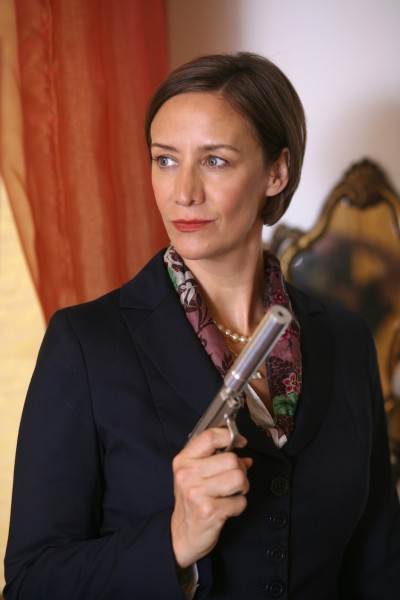
 I watched this purely on the strength of
I watched this purely on the strength of  ★★★★½
★★★★½ In terms of content, there isn’t much alteration, with the only real change, a small but significant cut at the end of Volume 1. What’s removed, is Bill’s line, “Is she aware her daughter is still alive?” This means neither audience nor heroine know this, until she shows up at Bill’s house for the final confrontation. [I have to say, her daughter certainly doesn’t seem like a four-year old either.] Rather than substance, the biggest difference for me was stylistic: the overall balance seemed more even, as a single entity, than seen as two separate pieces months apart. Volume 2 seemed excessively talky on its own. While that’s still the case, it’s to a significantly lesser degree, being balanced directly by the first half, where The Bride engages in actions, not words. Indeed, the only person she kills in the second part is Bill, a sharp contrast to the pile of corpses left in her wake during its predecessor. His death still feels somewhat rushed, and it’s a shame the original ending – a swordfight between Bill and Beatrix, clad in her wedding dress, on the beach – couldn’t be filmed, because the production went over time.
In terms of content, there isn’t much alteration, with the only real change, a small but significant cut at the end of Volume 1. What’s removed, is Bill’s line, “Is she aware her daughter is still alive?” This means neither audience nor heroine know this, until she shows up at Bill’s house for the final confrontation. [I have to say, her daughter certainly doesn’t seem like a four-year old either.] Rather than substance, the biggest difference for me was stylistic: the overall balance seemed more even, as a single entity, than seen as two separate pieces months apart. Volume 2 seemed excessively talky on its own. While that’s still the case, it’s to a significantly lesser degree, being balanced directly by the first half, where The Bride engages in actions, not words. Indeed, the only person she kills in the second part is Bill, a sharp contrast to the pile of corpses left in her wake during its predecessor. His death still feels somewhat rushed, and it’s a shame the original ending – a swordfight between Bill and Beatrix, clad in her wedding dress, on the beach – couldn’t be filmed, because the production went over time.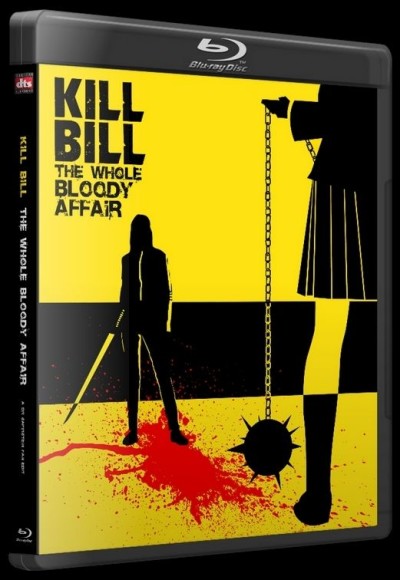 What hasn’t changed is the sheer, unadulterated awesomeness of the fights, as jaw-droppingly brutal and intense as they were ten years ago. Yuen Wo-Ping certainly cements his position as the most inventive and effective martial arts choreographer in history. Though this version has the entire House of Blue Leaves fight in colour, the arterial spray becomes
What hasn’t changed is the sheer, unadulterated awesomeness of the fights, as jaw-droppingly brutal and intense as they were ten years ago. Yuen Wo-Ping certainly cements his position as the most inventive and effective martial arts choreographer in history. Though this version has the entire House of Blue Leaves fight in colour, the arterial spray becomes 

































 Okay, I’m sure there are worse films on Netflix. Somewhere. But I haven’t yet found them/ Combining cheapjack production values with poor performances and woefully bad attempts at social commentary, the occasional decent fight sequence aren’t able to overcome the very significant negatives. The heroine is Noriko (Hellquist), who is raped by the Wall Street bigwig, Ronald Brooks, for whom she works – and then framed for his murder. She creates a secret identity, Shinobi Girl: as well as seeking to expose the real killer, she acts as the protector of the 99%, hunting down and dispatching the decadent uber-rich. They are led by Brooks’ widow (Fahey), and commit heinous crimes with no fear of legal reprisal, up to and including orgies of murder and cannibalism (!).
Okay, I’m sure there are worse films on Netflix. Somewhere. But I haven’t yet found them/ Combining cheapjack production values with poor performances and woefully bad attempts at social commentary, the occasional decent fight sequence aren’t able to overcome the very significant negatives. The heroine is Noriko (Hellquist), who is raped by the Wall Street bigwig, Ronald Brooks, for whom she works – and then framed for his murder. She creates a secret identity, Shinobi Girl: as well as seeking to expose the real killer, she acts as the protector of the 99%, hunting down and dispatching the decadent uber-rich. They are led by Brooks’ widow (Fahey), and commit heinous crimes with no fear of legal reprisal, up to and including orgies of murder and cannibalism (!).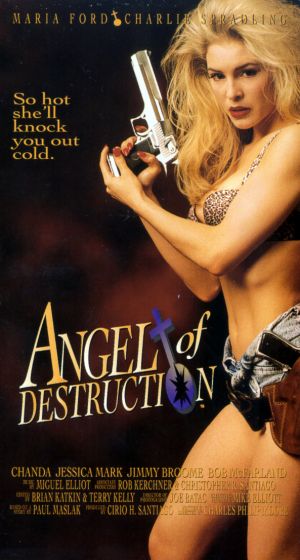 Make no mistake. By few objective standards could this be described as a “good” film. It is, however, one I found entertaining as all get-out, in a “WTF were they thinking?” kinda way. The main story has Hawaiian cop Jo Alwood (Ford) hunting sleazebag psycho mercenary Robert Kell (Broome), He killed Jo’s sister, among a slew of other women, just after she had accepted a position as bodyguard to bisexual S/M pop star Delilah (Mark), who is his final target. If this sounds a bit familiar, it’s a remake of 1992’s Blackbelt, by the same director, which starred Don ‘The Dragon’ Wilson as the cop. Ford isn’t as good as martial arts, but makes up for this shortcoming by the frequency with which she takes her top off. Heck, she even combines the two, and does martial arts clad only in a thong, which reminded me of another Roger Corman Philippino production,
Make no mistake. By few objective standards could this be described as a “good” film. It is, however, one I found entertaining as all get-out, in a “WTF were they thinking?” kinda way. The main story has Hawaiian cop Jo Alwood (Ford) hunting sleazebag psycho mercenary Robert Kell (Broome), He killed Jo’s sister, among a slew of other women, just after she had accepted a position as bodyguard to bisexual S/M pop star Delilah (Mark), who is his final target. If this sounds a bit familiar, it’s a remake of 1992’s Blackbelt, by the same director, which starred Don ‘The Dragon’ Wilson as the cop. Ford isn’t as good as martial arts, but makes up for this shortcoming by the frequency with which she takes her top off. Heck, she even combines the two, and does martial arts clad only in a thong, which reminded me of another Roger Corman Philippino production,  Patty (Eleniak) is in an abusive relationship, but finds an outlet through an unconventional source – boxing. This comes through her friend June (Ellis), who works occasionally as a ring-girl for a promoter (Doman). One of his fighters is Tommy (Colby), a part-time boxer whose main source of income is as a limo driver, but also helps run a gym in the upstate New York city of Troy, which helps keep the local kids out of trouble. Reluctantly, he agrees to train Patty, who develops, not only physical strength as a result, but the self-confidence to handle her situation.
Patty (Eleniak) is in an abusive relationship, but finds an outlet through an unconventional source – boxing. This comes through her friend June (Ellis), who works occasionally as a ring-girl for a promoter (Doman). One of his fighters is Tommy (Colby), a part-time boxer whose main source of income is as a limo driver, but also helps run a gym in the upstate New York city of Troy, which helps keep the local kids out of trouble. Reluctantly, he agrees to train Patty, who develops, not only physical strength as a result, but the self-confidence to handle her situation.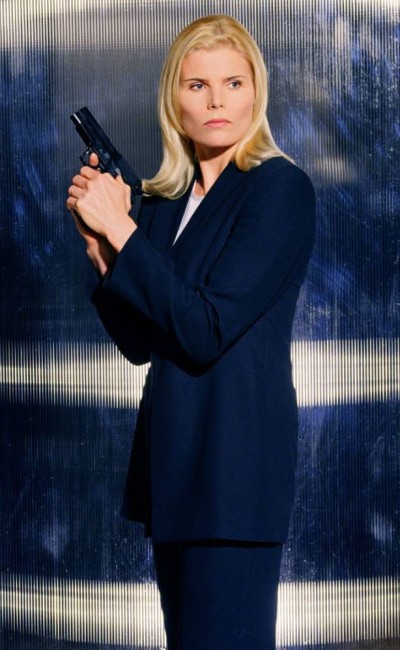 The low score for this is partly not entirely the film’s fault. Despite the title, it’s actually the third entry in a series of TV movies – following First Daughter and First Target. All focus on blonde Secret Service agent Alex McGregor, charged with protecting the President and his family. However, only this one is available on Netflix, which is where I picked it up: had I known in advance, I would likely have started at the beginning. Certainly, the abundance of references to events prior to the start of this movie becomes explicable – if no less irritating – and this might well make more sense if you’ve seen, in particular, First Daughter. The makers seem largely to ignore the second entry, First Target – perhaps because the role of McGregor there was played by Daryl Hannah, after Mariel Hemingway turned down the role she had played in #1. She returned here,
The low score for this is partly not entirely the film’s fault. Despite the title, it’s actually the third entry in a series of TV movies – following First Daughter and First Target. All focus on blonde Secret Service agent Alex McGregor, charged with protecting the President and his family. However, only this one is available on Netflix, which is where I picked it up: had I known in advance, I would likely have started at the beginning. Certainly, the abundance of references to events prior to the start of this movie becomes explicable – if no less irritating – and this might well make more sense if you’ve seen, in particular, First Daughter. The makers seem largely to ignore the second entry, First Target – perhaps because the role of McGregor there was played by Daryl Hannah, after Mariel Hemingway turned down the role she had played in #1. She returned here,  The back-story behind how this was made is, in some ways, more interesting than the film itself. The star and co-writer was working as a stripper, and came up with the idea, almost as a coping mechanism to handle some of the creeps with whom she had to interact. Funding came from a customer at one of the clubs. But, unfortunately, it turned out that the money he was “investing” was actually being embezzled, leading to a two-year crawl through post-production – it still hasn’t received an official release in its American home. Made in 1997, it looks like a fossil from an earlier, much scuzzier era, with both its grimy New York locations and feel harking back to the work of Abel Ferrara.
The back-story behind how this was made is, in some ways, more interesting than the film itself. The star and co-writer was working as a stripper, and came up with the idea, almost as a coping mechanism to handle some of the creeps with whom she had to interact. Funding came from a customer at one of the clubs. But, unfortunately, it turned out that the money he was “investing” was actually being embezzled, leading to a two-year crawl through post-production – it still hasn’t received an official release in its American home. Made in 1997, it looks like a fossil from an earlier, much scuzzier era, with both its grimy New York locations and feel harking back to the work of Abel Ferrara.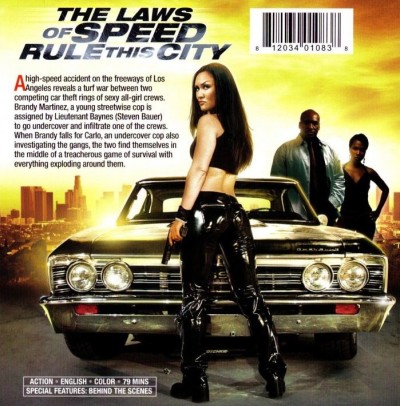 After a freeway chase ends in a fatal crash, a policewoman (Lizette) goes undercover to infiltrate the warring gangs of car thieves responsible. As “Baby” Martinez, she helps Eve (Lethridge) evade capture by an irate car-owner and, as a result, is recruited to join the all-female group of which Eve is a part, operating under the protection of Mama (Olivia Brown). However, Eve has a past to contend with, having defected from the gang led by Knight (Parker) – and worse still, taken his classic car with her. Unknown to her, the trunk holds a stash of drugs, whose loss leaves Knight feeling the heat from those in the criminal food chain above him. As a result, he’s prepared to go to any lengths to recover his property.
After a freeway chase ends in a fatal crash, a policewoman (Lizette) goes undercover to infiltrate the warring gangs of car thieves responsible. As “Baby” Martinez, she helps Eve (Lethridge) evade capture by an irate car-owner and, as a result, is recruited to join the all-female group of which Eve is a part, operating under the protection of Mama (Olivia Brown). However, Eve has a past to contend with, having defected from the gang led by Knight (Parker) – and worse still, taken his classic car with her. Unknown to her, the trunk holds a stash of drugs, whose loss leaves Knight feeling the heat from those in the criminal food chain above him. As a result, he’s prepared to go to any lengths to recover his property.